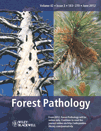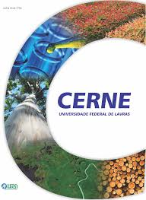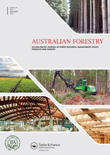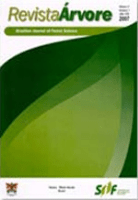
FOREST PATHOLOGY
Scope & Guideline
Unraveling the Secrets of Forest Ecosystems
Introduction
Aims and Scopes
- Investigation of Fungal Pathogens:
The journal publishes studies that investigate various fungal pathogens affecting forest trees, including their identification, pathogenicity, and ecological impact. - Molecular Techniques in Pathology:
There is a strong emphasis on molecular methodologies, such as qPCR and genetic characterization, to understand pathogen behavior and tree responses to diseases. - Ecological and Environmental Interactions:
Research exploring the interactions between pathogens and their environments, including soil, host species, and climatic factors, is a core focus. - Management and Control Strategies:
The journal addresses practical management strategies for disease control in forestry, including the use of biocontrol agents and integrated disease management approaches. - Emerging Tree Diseases:
Studies on newly identified or emerging diseases affecting trees, particularly those that pose significant threats to forest health, are a consistent area of publication.
Trending and Emerging
- Climate Change Impacts on Forest Pathology:
There is a growing body of work examining how climate change affects tree diseases, including shifts in pathogen distribution and disease severity. - Genetic Resistance and Tree Breeding:
Research focusing on the genetic resistance of tree species to various pathogens is gaining traction, highlighting the importance of breeding programs in forestry. - Integrated Pest and Disease Management:
An increasing number of studies are exploring integrated approaches combining biological control, chemical treatments, and cultural practices for effective disease management. - Phylogenetic Studies of Pathogens:
There is a notable trend towards phylogenetic and molecular studies that provide insights into the evolutionary relationships among tree pathogens, enhancing understanding of their biology and ecology. - Use of Technology in Pathology Research:
Emerging technologies, such as remote sensing and real-time monitoring, are being increasingly applied to assess and manage forest diseases, indicating a shift towards innovative methodologies.
Declining or Waning
- Non-Fungal Pathogens:
Research on bacterial and viral pathogens has been less frequent compared to studies on fungal diseases, indicating a waning interest or perceived importance in these areas. - Historical Pathology Studies:
There seems to be a decrease in studies focusing solely on historical accounts of tree diseases, as the journal shifts towards more contemporary issues and emerging pathogens. - Generalized Disease Surveys:
Publications that present general surveys of diseases without specific case studies or detailed methodologies are becoming less prominent, with a trend towards more focused research.
Similar Journals

Cerne
Advancing Sustainable Forest Practices for a Greener TomorrowCerne is a distinguished open-access journal dedicated to advancing knowledge in the field of forestry, published by the Universidade Federal de Lavras (UFLA). Since its inception in 1994, the journal has actively contributed to the global discourse on sustainable forest management and biodiversity conservation, presenting research findings that are both relevant and impactful. With its ISSN 0104-7760, Cerne aims to foster collaboration among researchers, professionals, and students, enhancing the understanding of forestry practices in Brazil and beyond. As of 2023, it holds a respectable Q3 ranking in the forestry category, further cementing its position within the academic community, illustrated by a Scopus ranking of #97 out of 174 in the Agricultural and Biological Sciences - Forestry field. Operating under an open-access model allows for wide dissemination of research outputs, ensuring that critical findings reach a broad audience, fueling further innovation and discovery in the field. With converged years extending from 2007 to 2024, Cerne continues to be a vital resource for anyone engaged in forestry research and practices.

Tropics
Unveiling the secrets of the tropics for future generations.Tropics, published by the Japan Society for Tropical Ecology, is a prominent journal dedicated to advancing the field of tropical ecology, conservation, and environmental science. With an ISSN of 0917-415X and E-ISSN of 1882-5729, this journal has become a vital resource for researchers, professionals, and students interested in the intricate dynamics of tropical ecosystems. Although it operates as a non-open access publication, it continues to foster academic discourse and collaboration, evident from its various Scopus rankings across categories such as Environmental Science and Agricultural and Biological Sciences. As of 2023, Tropics stands resilient in its mission, providing invaluable insights, promoting sustainable practices, and addressing pressing ecological challenges within tropical environments. The journal’s contributions have been acknowledged since its inception in 1997, making it an essential part of the scientific literature landscape and a key player in supporting tropical ecological research.

Austrian Journal of Forest Science
Fostering ecological knowledge for a greener future.Austrian Journal of Forest Science, published by OSTERREICHISCHER AGRARVERLAG, is a distinguished peer-reviewed journal dedicated to advancing knowledge in the fields of forestry and ecological science. With an ISSN of 0379-5292 and an E-ISSN of 0375-524X, this journal serves as a vital platform for researchers, professionals, and students alike, aiming to disseminate innovative research findings, methodologies, and case studies pertinent to forest conservation, management, and policy. Situated in Austria, its diverse scope encompasses critical topics within ecology, evolution, and biodiversity, evidenced by its competitive quartile rankings in 2023, placing it in Q2 for Forestry and Q3 in other related fields. The journal is committed to fostering a deeper understanding of forest ecosystems, making it an essential resource for anyone invested in sustainable forestry practices and environmental policy.

AUSTRALIAN FORESTRY
Championing Knowledge for Sustainable ForestryAustralian Forestry is an esteemed journal dedicated to advancing knowledge in the field of forestry and related environmental science. Published by Taylor & Francis Australia, this journal plays a pivotal role in disseminating high-quality research that spans various aspects of forestry, including sustainable management, conservation practices, and policy analysis. With an impact factor reflecting its significance in the academic community and a Scopus rank of #44 out of 174 in the category of Agricultural and Biological Sciences, Australian Forestry proudly holds a Q2 ranking in its field as of 2023. The journal has maintained a continuous publication record since its inception in 1936, with a commitment to addressing contemporary challenges within forestry. Researchers, professionals, and students alike are invited to engage with this vital resource that fosters insightful dialogue, innovative solutions, and a deeper understanding of forestry science.

Journal of Forest Science
Empowering global forestry through open access.Journal of Forest Science, published by the Czech Academy Agricultural Sciences, serves as a pivotal resource in the field of forestry and soil science. With its ISSN 1212-4834 and E-ISSN 1805-935X, this Open Access journal has been delivering insightful research since 2003, making knowledge freely available to researchers and practitioners globally. Hailing from the Czech Republic, the journal has established a notable impact within the academic community, as evidenced by its placements in the Q2 quartile for Forestry and Q3 for Soil Science according to the latest rankings. This positions the Journal of Forest Science favorably within academic discourse, ranking #73 out of 174 in Forestry and #84 out of 159 in Soil Science on Scopus, placing it at the 58th and 47th percentiles respectively. Covering a wide range of topics that intersect with environmental sustainability, forest management, and ecological research, the journal aims to foster innovation and collaboration within the scientific community. Researchers, professionals, and students can access published articles easily, bolstering the advancement of knowledge in forest science and its related disciplines.

Revista Cubana de Ciencias Forestales
Leading the way in sustainable forest management and conservation.Revista Cubana de Ciencias Forestales, published by UNIV PINAR RIO HERMANOS SAIZ MONTES OCA, is a vital resource in the field of forestry and environmental sciences. Since its inception in 2013, this Open Access journal has dedicated itself to disseminating high-quality research and innovations pertinent to forest ecology, sustainable management, and conservation strategies within the Cuban context and beyond. The journal aims to foster academic dialogue among researchers, professionals, and students by providing a platform for the sharing of interdisciplinary studies that address contemporary challenges in forestry. With its commitment to accessibility, Revista Cubana de Ciencias Forestales ensures that knowledge is available to a global audience, thereby contributing to the advancement of forest sciences and ecological awareness.

EUROPEAN JOURNAL OF FOREST RESEARCH
Unveiling Insights for Climate-Resilient ForestsThe European Journal of Forest Research (ISSN: 1612-4669; E-ISSN: 1612-4677), published by Springer, stands at the forefront of advancing the field of forestry and plant sciences. With a distinguished reputation reflected in its Q1 category rankings in both Forestry and Plant Science for 2023, this journal excels in disseminating high-quality research that addresses the critical challenges facing forest ecosystems across Europe and beyond. Established in Germany, the journal has transitioned through various phases since its inception in 1996, striving to integrate innovative research findings that promote sustainable forest management and conservation strategies. As part of a rich academic tradition, it boasts a commendable ranking within the Scopus database, placing it in the top echelons of its category. Researchers and practitioners alike can benefit from its commitment to open access options, ensuring that cutting-edge studies are accessible to a global audience. The European Journal of Forest Research serves as an essential platform for knowledge exchange, aiming to enhance the understanding of forest dynamics and improve the management of forest resources in the face of a changing climate.

SILVA FENNICA
Innovating Sustainable Solutions for Forest ScienceSILVA FENNICA, publishing since 1976, is a premier open-access journal dedicated to the advancement of knowledge in the fields of Forestry and Ecological Modeling. Released under the stewardship of the Finnish Society of Forest Science in collaboration with the Natural Resources Institute Finland, this journal serves as a vital resource for researchers, professionals, and students alike, fostering the exchange of innovative ideas and research findings. With an impressive impact factor placed in the Q1 category for Forestry and holding a commendable Q3 position in Ecological Modeling as of 2023, SILVA FENNICA illustrates its significance by ranking 47th in Forestry and 19th in Ecological Modeling according to Scopus metrics, reflecting a robust peer recognition and dissemination of scholarly work. The journal offers open access to all published articles since 1998, ensuring wide visibility and accessibility of research outputs. Located in Finland, SILVA FENNICA invites contributions that address sustainable forestry practices, forest ecology, and ecological modeling with a commitment to promoting scientific discussion and environmental stewardship.

REVISTA ARVORE
Cultivating Knowledge for Sustainable ForestryREVISTA ARVORE is a distinguished, peer-reviewed journal in the field of Forestry, published by Universidade Federal de Viçosa in Brazil. Renowned for its commitment to open access since 2002, this journal facilitates the dissemination of innovative research and knowledge to a global audience, encompassing topics from sustainable forest management to ecological conservation. With an impact factor reflective of its engagement in the community and a current Scopus ranking that places it in the 28th percentile among journals in Agricultural and Biological Sciences, it provides a vital platform for both emerging and established scholars. The journal is indexed under ISSN 0100-6762 and E-ISSN 1806-9088, making it accessible to a wide readership. As it converges its publication years from 2006 to 2024, REVISTA ARVORE aims to contribute significantly to the advancement of forestry science and practices, thereby encouraging environmental sustainability and innovation within the field.

NEW FORESTS
Advancing the Science of Sustainable Forestry.NEW FORESTS, published by SPRINGER, stands at the forefront of forestry research, delivering cutting-edge insights into forest science, management, and conservation. With an ISSN of 0169-4286 and an E-ISSN of 1573-5095, this esteemed journal has earned a distinguished reputation as it continues to contribute significantly to the field since its inception in 1986. As evidenced by its impressive ranking in the Q1 category for Forestry and being positioned at #32/174 in the Scopus Ranks for Agricultural and Biological Sciences, NEW FORESTS maintains an 81st percentile standing, emphasizing its influential role in advancing scientific discourse. The journal focuses on a diverse array of topics within the realm of forestry, making it an essential resource for researchers, professionals, and students eager to engage with contemporary developments and challenges in forest ecosystems. Although it is not an open-access journal, access to its articles can be facilitated through various academic institutions and libraries, ensuring that vital research is available to a broad audience. As we look toward the future, NEW FORESTS continues to strive for excellence, fostering dialogue and collaboration among scholars committed to sustainable forest management and restoration until at least 2024.